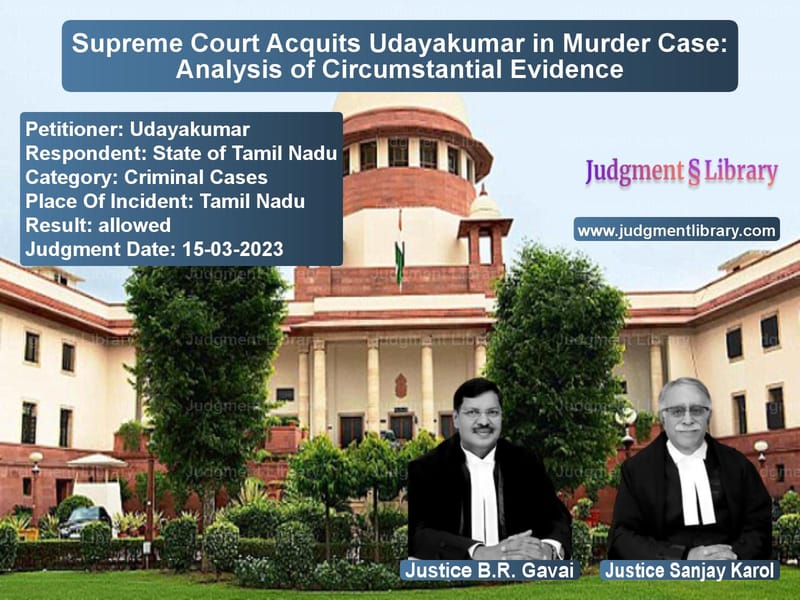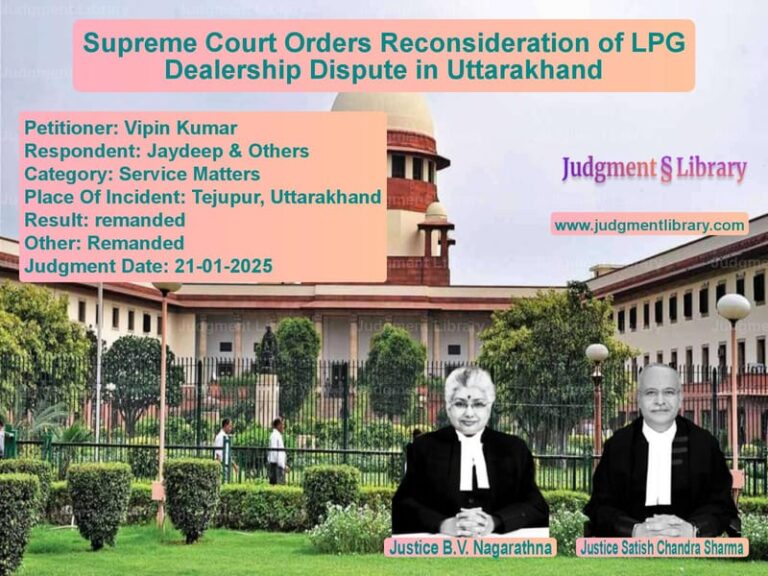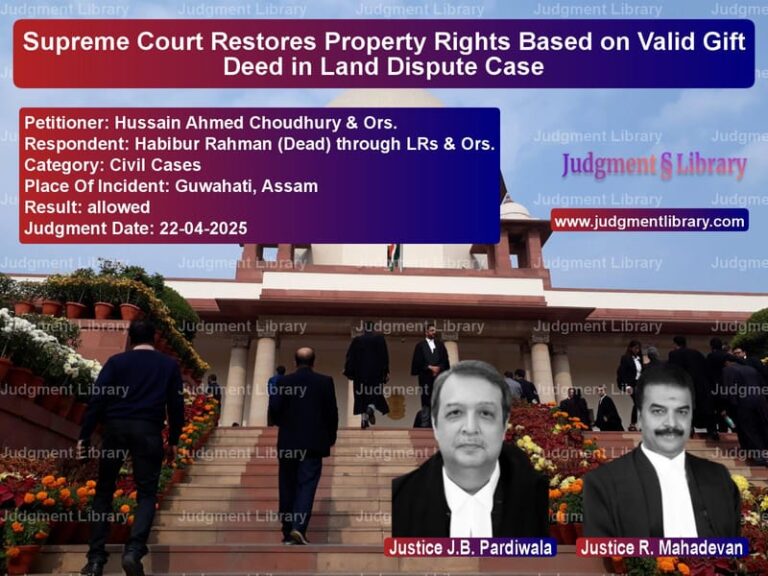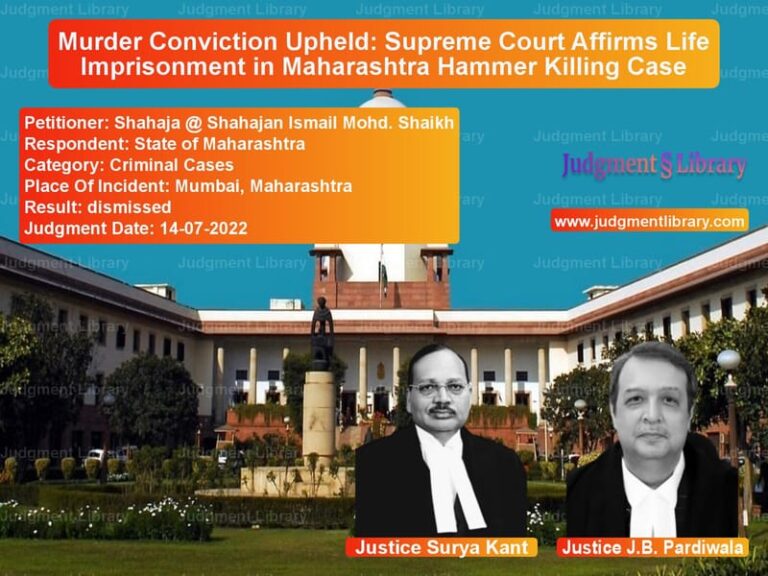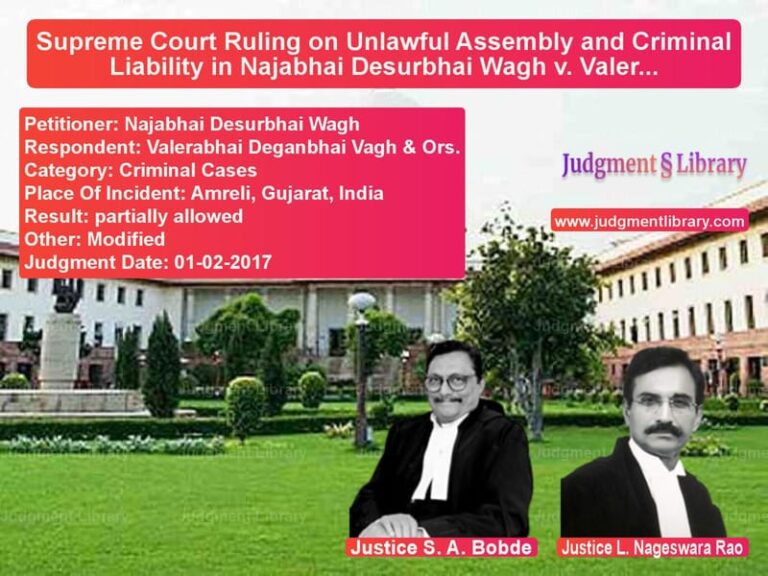Supreme Court Acquits Udayakumar in Murder Case: Analysis of Circumstantial Evidence
The Supreme Court of India has delivered a significant ruling in the case of Udayakumar v. State of Tamil Nadu, emphasizing the importance of circumstantial evidence and legal standards for conviction. The Court overturned the conviction of the appellant, Udayakumar, who was sentenced to life imprisonment under Section 302 of the Indian Penal Code (IPC) for the alleged murder of Purushothaman.
This judgment highlights key legal principles, including the necessity of proving guilt beyond a reasonable doubt and the unreliability of weak identification evidence.
Background of the Case
The prosecution alleged that the deceased, Purushothaman, was murdered on 22.10.2008. The case was built on the assertion that Udayakumar (A-2) had been engaged to kill the deceased as part of a conspiracy involving Panneer Dass (A-1) and Periyasamy (A-3). According to the prosecution:
- A-1 had a business rivalry with the deceased and harbored a grudge.
- A-1 and A-3 allegedly conspired to murder the deceased and hired A-2 for execution.
- On 22.10.2008, at approximately 8:30 PM, A-2 purportedly attacked the deceased with a sickle, delivering fatal blows to the neck.
- After the attack, A-1 and A-3 allegedly arrived in a vehicle and facilitated A-2’s escape.
Following the incident, an FIR (No. 2261/2008) was registered, and a police investigation was initiated. The case proceeded to trial, leading to convictions based on the testimony of prosecution witnesses.
Trial Court Conviction and High Court’s Partial Acquittal
The Trial Court convicted all three accused under Sections 302 and 120-B of the IPC, sentencing them to life imprisonment. However, upon appeal, the High Court acquitted A-1 and A-3 but upheld Udayakumar’s conviction based solely on the testimony of PW-1 (Venkatesan), an alleged eyewitness.
The High Court’s judgment raised concerns because it:
- Disbelieved the conspiracy theory but still convicted A-2.
- Relied exclusively on PW-1’s identification of A-2.
- Ignored inconsistencies in the identification process.
- Did not find any forensic or scientific evidence linking A-2 to the crime.
Arguments of the Parties
Petitioner’s Arguments (Udayakumar)
- The defense contended that there was no direct evidence linking Udayakumar to the crime.
- PW-1’s identification was unreliable and contradicted by the investigating officer (PW-23).
- There was no forensic evidence or recovery of the alleged weapon.
- The identity of the accused was already known before the test identification parade, making it a meaningless exercise.
- Since A-1 and A-3 were acquitted, the conviction of A-2 on the same evidence was legally inconsistent.
Respondent’s Arguments (State of Tamil Nadu)
- The prosecution argued that PW-1’s testimony was credible and sufficient for conviction.
- Despite the High Court disbelieving the conspiracy theory, the eyewitness testimony confirmed A-2’s role.
- Although forensic evidence was lacking, circumstantial evidence pointed to A-2’s guilt.
Key Observations of the Supreme Court
The Supreme Court analyzed the inconsistencies in the prosecution’s case and emphasized the importance of proving guilt beyond reasonable doubt. The key observations included:
- Unreliability of PW-1’s Testimony: The Court found contradictions between PW-1’s statement and PW-23’s investigation report. PW-1 claimed to have identified A-2 only in a test identification parade, whereas PW-23 suggested the identity was already known.
- Lack of Corroborative Evidence: The prosecution failed to provide scientific, forensic, or documentary evidence linking Udayakumar to the crime.
- Misuse of Test Identification Parade (TIP): The Court reiterated that TIPs are necessary only when the accused are unknown to the witnesses. Since the identity was known, the TIP held no evidentiary value.
- Principles of Conviction Based on Circumstantial Evidence: The Court referenced Sharad Birdhichand Sarda v. State of Maharashtra (1984) 4 SCC 116, stating that circumstantial evidence must form a complete chain excluding all hypotheses except the guilt of the accused.
- Precedents on Single Eyewitness Testimony: The Court cited Anil Phukan v. State of Assam (1993) 3 SCC 282, holding that a sole witness can be relied upon only if deemed wholly reliable.
- Acquittal of Co-Accused: Since A-1 and A-3 were acquitted on the same evidence, convicting A-2 amounted to miscarriage of justice.
Final Ruling
The Supreme Court ruled in favor of Udayakumar, setting aside his conviction and stating:
- The prosecution failed to establish guilt beyond reasonable doubt.
- The testimony of PW-1 was unreliable and contradicted by investigative findings.
- There was no forensic or corroborative evidence linking A-2 to the crime.
- Since A-1 and A-3 were acquitted, the conviction of A-2 was legally unsustainable.
Accordingly, the Court acquitted Udayakumar and discharged his bail bond.
Implications of the Judgment
This ruling carries significant implications for criminal jurisprudence:
- Strengthening the Burden of Proof: The judgment reinforces that conviction must be based on strong and consistent evidence.
- Importance of Corroboration: Courts must exercise caution when relying on a single eyewitness without independent corroboration.
- Forensic Evidence Matters: The ruling highlights the need for scientific evidence to support allegations in criminal trials.
- Prevention of Wrongful Convictions: This case serves as a reminder that courts must scrutinize prosecution evidence carefully to prevent injustice.
Conclusion
The Supreme Court’s decision in Udayakumar v. State of Tamil Nadu is a landmark ruling that upholds the fundamental principle of criminal law—innocent until proven guilty. By acquitting Udayakumar, the Court reaffirmed that convictions must be based on solid evidence rather than weak identification or presumptive inferences.
This judgment sets a critical precedent, ensuring that justice prevails and that legal safeguards against wrongful convictions remain intact.
Petitioner Name: Udayakumar.Respondent Name: State of Tamil Nadu.Judgment By: Justice B.R. Gavai, Justice Sanjay Karol.Place Of Incident: Tamil Nadu.Judgment Date: 15-03-2023.
Don’t miss out on the full details! Download the complete judgment in PDF format below and gain valuable insights instantly!
Download Judgment: udayakumar-vs-state-of-tamil-nadu-supreme-court-of-india-judgment-dated-15-03-2023.pdf
Directly Download Judgment: Directly download this Judgment
See all petitions in Murder Cases
See all petitions in Bail and Anticipatory Bail
See all petitions in Fraud and Forgery
See all petitions in Judgment by B R Gavai
See all petitions in Judgment by Sanjay Karol
See all petitions in allowed
See all petitions in supreme court of India judgments March 2023
See all petitions in 2023 judgments
See all posts in Criminal Cases Category
See all allowed petitions in Criminal Cases Category
See all Dismissed petitions in Criminal Cases Category
See all partially allowed petitions in Criminal Cases Category

